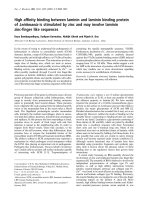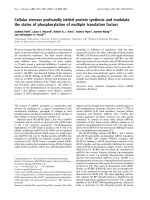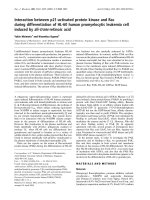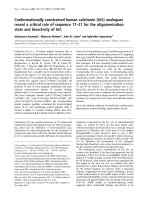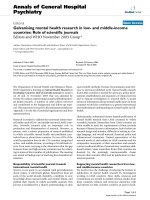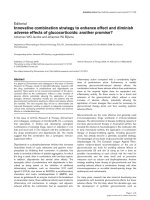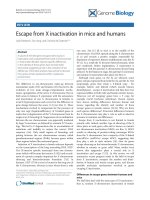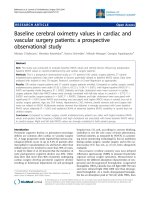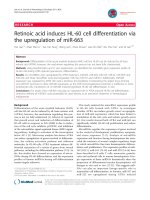Báo cáo y học: "Galvanising mental health research in low- and middle-income countries: Role of scientific journals." docx
Bạn đang xem bản rút gọn của tài liệu. Xem và tải ngay bản đầy đủ của tài liệu tại đây (196.2 KB, 4 trang )
BioMed Central
Page 1 of 4
(page number not for citation purposes)
Annals of General Hospital
Psychiatry
Open Access
Editorial
Galvanising mental health research in low- and middle-income
countries: Role of scientific journals
Editors and WHO November 2003 Group*
Address: Department of Mental Health and Substance Abuse, World Health Organization, Geneva
Email: Editors and WHO November 2003 Group* -
* Corresponding author
The Department of Mental Health and Substance Abuse,
WHO organized a meeting on Mental Health Research in
Developing Countries: Role of Scientific Journals in Geneva
on 20 and 21 November 2003 that was attended by
twenty-five editors representing journals publishing men-
tal health research. A number of other editors reviewed
and contributed to the background and follow-up mate-
rial. This statement is issued by all participants jointly (see
Appendix 1 for the list of journals/organizations and their
representatives).
Research is needed to address the enormous unmet men-
tal health needs of low- and middle-income (LAMI) coun-
tries. Scientific journals play an important role in
production and dissemination of research. However, at
present, only a minute proportion of research published
in widely accessible mental health and psychiatric jour-
nals is from or about these countries. Yet over 85% of the
world's population lives in the 153 countries categorized
as low- and middle-income, according to World Bank cri-
teria. Even more worrying is the observation that the gap
between these and high-income countries may be widen-
ing in terms of their number of publications. The meeting
was aimed at finding ways of resolving this unsatisfactory
situation.
Responsibility of scientific journals towards
international mental health
Science, in its quest to accomplish valid generalisations
about nature, is inherently global. Researchers from all
parts of the world should, desirably, contribute to new
knowledge about mental health and mental illness, and
publish their reports in widely accessible journals. This
process is facilitated by a shared understanding of aims
and scientific methods, formats of presentation and refer-
ence to previous published work. Mental health research
from LAMI countries is needed for advocacy, policy devel-
opment, establishment and expansion of clinical services
and to educate investigators in research skills. A steady
stream of information about mental health issues in these
countries would also contribute to a greater international
and multicultural understanding of mental health and ill-
health.
Unfortunately, substantial barriers impede publication of
mental health research from LAMI countries in widely
accessible journals. Researchers from LAMI countries are
often unable to meet the requirements of these journals
because of limited access to information, lack of advice on
research design and statistics, difficulty in writing in a for-
eign language, and overall material, financial, policy and
infrastructural constraints. Limited appreciation of the
research needs of, and realities in LAMI countries and the
comparative anonymity of their researchers and research
centres in editorial offices of journals may constitute addi-
tional barriers. Many researchers from LAMI countries are
daunted by the seemingly insurmountable chasm
between their research effort and its publication in inter-
national journals.
Supporting mental health researchers from low-
and middle-income countries
We need to face the challenge of reducing the barriers to
publication of mental health research by investigators
working in LAMI countries. Time, skills, resources and
commitment are needed to publish relevant studies from
these countries. Editors' and reviewers' experience with
and interest in LAMI countries could be an asset in facili-
Published: 01 March 2004
Annals of General Hospital Psychiatry 2004, 3:5
Received: 25 February 2004
Accepted: 01 March 2004
This article is available from: />© 2004 Editors and WHO November 2004 Group; licensee BioMed Central Ltd. This is an Open Access article: verbatim copying and redistribution of
this article are permitted in all media for any purpose, provided this notice is preserved along with the article's original URL.
Annals of General Hospital Psychiatry 2004, 3 />Page 2 of 4
(page number not for citation purposes)
tating publication. Meeting researchers from these coun-
tries on 'their home ground' could assist this process.
International journals could also help researchers
improve their submissions by diligent assessment,
detailed recommendations for revision and sympathetic
consideration of revised versions, even if it means request-
ing reviewers to 'take an extra round' to make papers suit-
able for publication. This is not to say that journals need
to lower their standards in publishing papers from LAMI
countries; rather, they should devise strategies to help
authors attain those standards. Other approaches to sup-
port contributions from LAMI countries could be to
launch 'starter' sections such as information pages and
special columns or even dedicated issues of the journal.
Capacity building is the paramount factor in the long
term. Training in research methodology and scientific
writing is needed. This could be done through mentoring,
personal encouragement, training courses and research
collaboration. Increased access to mental health research
publications would, by itself, help in capacity building.
Supporting mental health journals from low- and
middle-income countries
A major impediment in accessing mental health research
from LAMI countries is the lack of visibility of journals
published in these countries. Most of them are not
indexed in international databases and are often not avail-
able beyond their country or region of origin. These jour-
nals are published under strained circumstances, in that
they often lack sound financial support and have a hard
time becoming self-sufficient. They also have difficulty in
obtaining suitable articles for publication because their
author pool is limited; moreover, influential authors from
this pool prefer to publish their best research in indexed
journals. Some authors who submit their articles to LAMI
country based journals may have limited skills in con-
ducting research and/or in writing up their reports. How-
ever, it must be stressed that some excellent work does
find publication in these journals.
The task of strengthening journals in LAMI countries
begins from the recognition of their role as contributors to
the enhancement of the mental health knowledge base
and as partners in the international research community.
Editors of LAMI country based journals require support to
elevate standards in editorial procedures, peer review and
overall journal management since sufficient expertise and
experience may be lacking. This could be achieved
through their participation in the publication process of
established journals, mentorship, twinning arrangements
and training workshops.
Enhancing dissemination of mental health
research publications
Many high quality mental health journals have a wide dis-
tribution, but most of their subscribers are from high-
income countries. Special attention to dissemination of
research findings is needed urgently in order to maximize
their impact on mental health policy and practice and
advance relevant research in LAMI countries. Increasing
online availability is cost-effective since little additional
expenditure is required to provide access to new users
apart from the initial costs of posting material on a web-
site. Free access to many categories of electronic resources
is provided by many journals. Initiatives such as the
WHO-led Health InterNetwork Access to Research Initia-
tive (HINARI) offer institutions in LAMI countries elec-
tronic access to thousands of journals at no or very low
cost. The Open Access model provides free online access
along with the possibility of unrestricted dissemination of
research materials, but charges for publication may be
prohibitive for authors from LAMI countries unless sup-
port comes from funding agencies and governments, e.g.
the Scientific Electronic Library Online (SciELO) project
in Latin America. Governments in other LAMI countries
need to be made aware of the opportunities provided by
information technology for dissemination and applica-
tion of research knowledge.
The role of various stakeholders
Editors of journals, editors' associations and international
organizations, including WHO could help achieve the
aforementioned objectives. A catalogue of ideas is pre-
sented in Appendix 2 to act as a starting point for specific
action. Although these ideas have been developed for the
field of mental health, many of them may apply to other
areas of health.
Appendix 1: Participants
Acta Psychiatrica Scandinavica (Povl Munk-Jorgensen),
American Journal of Orthopsychiatry (Carlos Sluzki),
Annals of General Hospital Psychiatry (George St. Kaprinis,
Konstantinos N. Fountoulakis), Anthropology and Medi-
cine (Sushrut Jadhav), Australian and New Zealand Jour-
nal of Psychiatry (Sidney Bloch), BioMed Central
Psychiatry (Pritpal S. Tamber), British Journal of Psychiatry
(Peter Tyrer), BMJ (Kamran Abbasi), Bulletin of World
Health Organization (Hooman Momen), Child Abuse and
Neglect, The International Journal (John M. Leventhal),
Chinese Journal of Nervous and Mental Disease (Li Yingxi,
Guan Jinli), Comprehensive Psychiatry (David L. Dunner),
Culture, Medicine and Psychiatry (Mary-Jo Delvecchio
Good), Epidemiologia e Psichiatria Sociale (Michele
Tansella), L'Evolution Psychiatrique (Yves Thoret), Indian
Journal of Psychiatry (Utpal Goswami), L'Information Psy-
chiatrique (Thierry Tremine), International Journal of
Social Psychiatry (Dinesh Bhugra), International Psychia-
Annals of General Hospital Psychiatry 2004, 3 />Page 3 of 4
(page number not for citation purposes)
try (Hamid Ghodse), Journal of Child and Adolescent
Mental Health (Alan Flisher), Journal of Nervous and Men-
tal Disease (Eugene B. Brody, Kathy McKnight), Lancet
(Laragh Gollogly), Primary Care Psychiatry (Sean Lynch),
Psychiatry: Interpersonal and Biological Processes (Robert
Ursano), Psychiatry Research (Monte Buchsbaum), Psy-
chological Medicine (Eugene Paykel), Psychology and Psy-
chotherapy: Theory, Research and Practice (Phil
Richardson), Psychopathologie Africaine (Momar Gueye),
Quarterly Journal of Pakistan Psychiatric Society (Amin A.
Gadit), Revista Brasileria de Psiquiatria (Jair Mari), Salud
Mental (Hector Perez-Rincon), Social Psychiatry and Psy-
chiatric Epidemiology (Paul Bebbington), South African
Journal of Psychiatry (Robin Emsley, Susan Hawkridge),
Transcultural Psychiatry (Laurence J. Kirmayer), World
Psychiatry (Mario Maj), Forum for African Medical Editors
(James K. Tumwine), Global Forum for Health Research
(Andres de Francisco), World Association of Medical Edi-
tors (Ana Marusic, Peush Sahni), World Health Organiza-
tion (Shekhar Saxena, Pratap Sharan, Benedetto Saraceno,
Barbara Aronson, Vladimir Poznyak, Izthak Levav, Edith
Certain, R Srinivasa Murthy, Tikki Pang).
Shekhar Saxena, Pratap Sharan, Hooman Momen and
Benedetto Saraceno organized the WHO Meeting leading
to this joint statement.
Appendix 2: Catalogue of ideas
Individual journals
Giving priority to relevant mental health research from low- and
middle-income countries
• Educate editors and reviewers on research needs of and
research infrastructure in LAMI countries;
• Use surveys of various stakeholders such as readers
(including those from other regions) for shaping journals'
priorities;
• Sensitize readers and other stakeholders to international
mental health issues (e.g. through special sections and
dedicated issues, guest editorship and the commissioning
of relevant research from LAMI countries);
• Critically re-examine the use and limitation of measures
such as citation rates and impact factors;
• Adopt a multilingual approach, such as translation of
relevant articles and abstracts into other languages;
• Include reviewers and correspondents with a special
interest and expertise in LAMI countries on editorial
boards;
• Accept a higher proportion of submissions from LAMI
countries for review; and
• Encourage general medical journals to publish mental
health research especially in countries/regions where no
mental health journal exists at present.
Supporting authors/researchers from low- and middle-income
countries
• Familiarize researchers from LAMI countries with the
peer review process;
• Provide constructive critical feedback/detailed recom-
mendations for revision;
• Make provision for extra rounds of editing, assistance
with language and use of technical editors;
• Pay attention to the educational goals of the review
process (e.g. availability of reviewer's comments to read-
ers or recruiting young researchers in LAMI countries to
referee papers);
• Provide mentorship and support prior to submission;
• Organise training workshops for LAMI country research-
ers and students on scientific writing and research meth-
odology;
• Facilitate the involvement of researchers in multi-centre
projects and research groups;
• Accept and process submissions online; and
• Devise strategies to prevent economic exclusion of
researchers from LAMI countries in author/input paying
publishing models.
Supporting journals from low- and middle-income countries
• Support "twinning" or "pairing" arrangements, such as
invited editorials, exchange of journals, cross-publication
of contents/abstracts/summaries/articles and joint publi-
cations;
• Agree to serve on editorial boards or as reviewers;
• Agree to mentor reviewers and editors;
• Provide training workshops for editors and reviewers;
and
• Support national/regional journals in developing their
own websites and/or seeking inclusion in specialized
websites on mental health
Enhancing Dissemination
• Participate in electronic dissemination initiatives or pro-
vision of free/open access through the journal's website;
Publish with BioMed Central and every
scientist can read your work free of charge
"BioMed Central will be the most significant development for
disseminating the results of biomedical research in our lifetime."
Sir Paul Nurse, Cancer Research UK
Your research papers will be:
available free of charge to the entire biomedical community
peer reviewed and published immediately upon acceptance
cited in PubMed and archived on PubMed Central
yours — you keep the copyright
Submit your manuscript here:
/>BioMedcentral
Annals of General Hospital Psychiatry 2004, 3 />Page 4 of 4
(page number not for citation purposes)
• Participate in "buddy system"/peer sponsoring initia-
tives;
• Employ user-friendly technology for easier downloads;
• Subsidize journal subscriptions for LAMI countries; and
• Explore mechanisms for publication of selected papers
in more than one journal for wider dissemination.
Editors' associations
• Develop guidelines for good editorial practice concern-
ing publishing and research ethics and conflicts of inter-
est;
• Facilitate access to literature and bibliographic services
(e.g. through a directory of databases);
• Support authors to access appropriate specialized jour-
nals and specific audience (e.g. through a database of
journals and instructions to authors);
• Facilitate mentoring for editors, reviewers and research-
ers;
• Organise training of editors, reviewers and researchers
from LAMI countries; and
• Facilitate the multidirectional flow of articles, resources
and expertise (e.g. translation of relevant articles and sup-
port with information technology).
International organizations
Supporting mental health research, research infrastructure and
publications
• Influence other international institutions to give priority
to mental health research in their agendas for LAMI coun-
tries;
• Support national institutions in LAMI countries to urge
their governments to give higher priority to mental health
research;
• Support inclusion of researchers/editors from LAMI
countries in relevant decision-making forums; and
• Facilitate capacity building for researchers and journals
from LAMI countries.
Enhancing Dissemination
• Assess information needs in LAMI countries and raise
awareness of these;
• Provide access to journals publishing mental health
research (e.g. expansion of HINARI or enabling journals
to be open access); and
• Encourage and facilitate the application of information
technology.
Enhancing Collaboration
• Develop networks between editors, editorial organiza-
tions, professional bodies, publishers, funding agencies,
national and international organizations and the media);
and
• Adopt a systematic approach for follow up: statement of
changes hoped for, development of outcome criteria,
assessment of progress.
